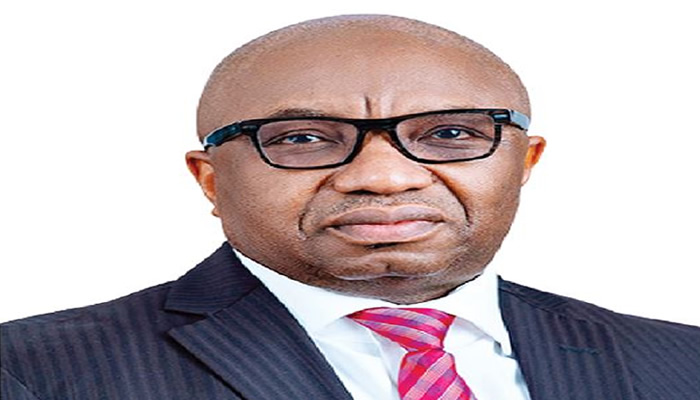Business
Data breach: FG slams N400m fine on four banks, others

The Nigeria Data Protection Commission has said more than 1000 financial institutions, schools, insurance companies, and consultancy firms are currently undergoing investigations for various degrees of breaches of citizens’ data.
This was as the commission’s National Commissioner, Vincent Olatunji, revealed that four major banks and three other institutions faced sanctions and incurred fines totalling N400m for infractions relating to breaches of citizens’ data.
Olatunji revealed this on Tuesday during an interactive session with journalists to mark the first anniversary of the signing into law of the Nigeria Data Protection Commission Act by President Bola Tinubu in Abuja.
On June 12, 2023, Tinubu assented to the data protection bill to advance privacy rights and other fundamental freedoms both in cyberspace and in analogue transactions.
The legislation allows Nigerians to seek redress from any form of data breach stipulating that citizens’ data is “processed in a fair, lawful and accountable manner”.
Recalling with nostalgia, the national commissioner stated, “As of this time last year, we were so unsure if the president would assent to the bill, what if the president didn’t sign it, what would have happened? The bill was passed by the ninth Assembly and usually, when a new government comes in, they want to jettison all that the former government did before it got there. More importantly, it was a new government. I was apprehensive, everyone was worried but I kept faith in God even though I was not sure too and on the 12th of June last year, the president signed it.”
Speaking further, Olatunji emphasised that the nation’s data ecosystem has surpassed a value of N10bn due to the multiplier effect of assenting to the bill.
He stressed the commission’s commitment to safeguarding citizens’ data by global best standards and practices, deeming it essential for ensuring its safety, security, and protection.
The national commissioner said, “Cumulatively, we have had over 1,000 reports of data breaches between when we started and now. The figure is low because of the low level of awareness among Nigerians.
Out of the 1,000 cases, about 400 of them are digital revenue companies that we call loan sharks but the main ones we have conducted investigations in the education sector, financial institutions, real estate, insurance, consulting, and schools and as of today, we have finalised four major investigations and some have paid their remediation fees. In the law, we can fine companies depending on the nature of the breach, impact on the subject and level of cooperation and we got N400m from remediation fees.”
He added that ongoing investigations were being conducted concerning data infractions.
Olatunji also highlighted that the activities of the NDPC have led to increased levels of compliance with the Nigeria Data Protection Act in both the private and public sectors.
“When we started, the levels of compliance within the private sector was about 49 per cent while the public sector was 4 per cent. But today, private sector compliance is above 55, while the public sector has reached 15 per cent “, Olatunji said.
The NDPC boss also announced that Nigeria is now at the forefront of the activities of the Global Data Assembly and has impacted the data ecosystem on the national economy as nations like Kenya, Ghana, China, Singapore, and Malaysia, among others.
“The Data Protection Act 2023 is a major milestone for Nigeria. Mr President laid our apprehension to rest when he signed the Act on June 12, 2023. It was a major turnaround for the industry. Now the data ecosystem is beyond everybody because it is a global phenomenon due to the impact of technology.
“In terms of jobs and wealth creation, promotion of tourism, perception and attraction of foreign direct investments into Nigeria, we have taken a leapfrog and even overtaken some countries.
“And that’s why Nigeria was given the hosting right for 2024 All African Data Protection Commission’s and Institutions. About 30 countries would be here next year for the event,” Olatunji said.
He said the commission had concluded arrangements to train 10,000 public servants in responsible data management, while about 1,000 data protection officers and processors including journalists would undergo training by the NDPC.
To check the activities of digital loan platforms, Olatunji said the NDPC collaborated with CBN, ICPC, EFCC, and other regulatory authorities, lamenting that most of the illegal digital loan platforms had no known or traceable addresses.
He, however, emphasised that ongoing efforts would focus on raising awareness among vulnerable Nigerians who fall prey to loan sharks due to lack of knowledge. He noted that the nation’s large population and vast landmass pose challenges to fully clamping down on the activities of digital loan sharks, as many operate from isolated or remote areas without identifiable addresses.
Business
Nigeria’s Inflation Drops to 15.10% as NBS Reports Deflationary Trend

Nigeria’s headline inflation rate declined to 15.10 per cent in January 2026, marking a significant drop from 27.61 per cent recorded in January 2025, according to the latest Consumer Price Index (CPI) report released by the National Bureau of Statistics.
The report also showed that month-on-month inflation recorded a deflationary trend of –2.88 per cent, representing a 3.42 percentage-point decrease compared to December 2025. Analysts say the development signals easing price pressures across key sectors of the economy.
Food inflation stood at 8.89 per cent year-on-year, down from 29.63 per cent in January 2025. On a month-on-month basis, food prices declined by 6.02 per cent, reflecting lower costs in several staple commodities.
The data suggests a sustained downward trajectory in inflation over the past 12 months, pointing to improving macroeconomic stability.
The administration of President Bola Ahmed Tinubu has consistently attributed recent economic adjustments to ongoing fiscal and monetary reforms aimed at stabilising prices, boosting agricultural output, and strengthening domestic supply chains.
Economic analysts note that while the latest figures indicate progress, sustaining the downward trend will depend on continued policy discipline, exchange rate stability, and improvements in food production and distribution.
The January report provides one of the clearest indications yet that inflationary pressures, which surged in early 2025, may be moderating.
Bank
Alpha Morgan to Host 19th Economic Review Webinar

Alpha Morgan to Host 19th Economic Review Webinar
In an economy shaped by constant shifts, the edge often belongs to those with the right information.
On Wednesday, February 25, 2026, Alpha Morgan Bank will host the 19th edition of its Economic Review Webinar, a high-level thought leadership session designed to equip businesses, investors, and individuals with timely financial and economic insight.
The session, which will hold live on Zoom at 10:00am WAT and will feature economist Bismarck Rewane, who will examine the key signals influencing Nigeria’s economic direction in 2026, including policy trends, market movements, and global developments shaping the local landscape.
With a consistent track record of delivering clarity in uncertain times, the Alpha Morgan Economic Review continues to provide practical context for decision-making in a dynamic environment.
Registration for the 19th Alpha Morgan Economic Review is free and can be completed via https://bit.ly/registeramerseries19
It is a bi-monthly platform that is open to the public and is held virtually.
Visit www.alphamorganbank to know more.
Business
GTBank Launches Quick Airtime Loan at 2.95%

GTBank Launches Quick Airtime Loan at 2.95%
Guaranty Trust Bank Ltd (GTBank), the flagship banking franchise of GTCO Plc, Africa’s leading financial services group, today announced the launch of Quick Airtime Loan, an innovative digital solution that gives customers instant access to airtime when they run out of call credit and have limited funds in their bank accounts, ensuring customers can stay connected when it matters most.
In today’s always-on world, running out of airtime is more than a minor inconvenience. It can mean missed opportunities, disrupted plans, and lost connections, often at the very moment when funds are tight, and options are limited. Quick Airtime Loan was created to solve this problem, offering customers instant access to airtime on credit, directly from their bank. With Quick Airtime Loan, eligible GTBank customers can access from ₦100 and up to ₦10,000 by dialing *737*90#. Available across all major mobile networks in Nigeria, the service will soon expand to include data loans, further strengthening its proposition as a reliable on-demand platform.
For years, the airtime credit market has been dominated by Telcos, where charges for this service are at 15%. GTBank is now changing the narrative by offering a customer-centric, bank-led digital alternative priced at 2.95%. Built on transparency, convenience and affordability, Quick Airtime Loan has the potential to broaden access to airtime, deliver meaningful cost savings for millions of Nigerians, and redefine how financial services show up in everyday life, not just in banking moments.
Commenting on the product launch, Miriam Olusanya, Managing Director of Guaranty Trust Bank Ltd, said: “Quick Airtime Loan reflects GTBank’s continued focus on delivering digital solutions that are relevant, accessible, and built around real customer needs. The solution underscores the power of a connected financial ecosystem, combining GTBank’s digital reach and lending expertise with the capabilities of HabariPay to deliver a smooth, end-to-end experience. By leveraging unique strengths across the Group, we are able to accelerate innovation, strengthen execution, and deliver a more integrated customer experience across all our service channels.”
Importantly, Quick Airtime Loan highlights GTCO’s evolution as a fully diversified financial services group. Leveraging HabariPay’s Squad, the solution reinforces the Group’s ecosystem proposition by bringing together banking, payment technology, and digital channels to deliver intuitive, one-stop experiences for customers.
With this new product launch, Guaranty Trust Bank is extending its legacy of pioneering digital-first solutions that have redefined customer access to financial services across the industry, building on the proven strength of its widely adopted QuickCredit offering and the convenience of the Bank’s iconic *737# USSD Banking platform.
About Guaranty Trust Bank
Guaranty Trust Bank (GTBank) is the flagship banking franchise of GTCO Plc, a leading financial services group with a strong presence across Africa and the United Kingdom. The Bank is widely recognized for its leadership in digital banking, customer experience, and innovative financial solutions that deliver value to individuals, businesses, and communities.
About HabariPay
HabariPay is the payments fintech subsidiary of GTCO Plc, focused on enabling fast, secure, and accessible digital payments for individuals and businesses. By integrating payments and digital technology, HabariPay supports innovative services that make everyday financial interactions simpler and more seamless.
Enquiries:
GTCO
Group Corporate Communication
[email protected]
+234-1-2715227
www.gtcoplc.com
-

 celebrity radar - gossips6 months ago
celebrity radar - gossips6 months agoWhy Babangida’s Hilltop Home Became Nigeria’s Political “Mecca”
-

 society6 months ago
society6 months agoPower is a Loan, Not a Possession: The Sacred Duty of Planting People
-

 society5 months ago
society5 months agoReligion: Africa’s Oldest Weapon of Enslavement and the Forgotten Truth
-

 news6 months ago
news6 months agoTHE APPOINTMENT OF WASIU AYINDE BY THE FEDERAL GOVERNMENT AS AN AMBASSADOR SOUNDS EMBARRASSING









